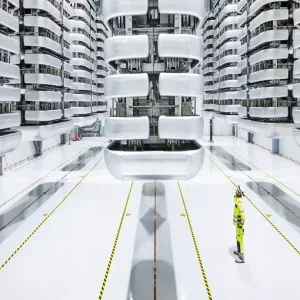The contract was signed in Dubai, at the France-UAE Business Forum.EDF will carry out all the necessary studies for the project (design, hydrogeological and environmental impact studies), and will organise the tender process to select a consortium of companies responsible for construction of the facility. The contract also encompasses monitoring of the construction site, performance of in-situ tests, and support for operations for a period of two years after entry into service. With six hydroelectric power plants of this kind in its portfolio in France, EDF offers unique expertise in support of the DEWA project.
Because of their ability to function as an energy reserve, pumped-storage hydropower facilities can be used to meet peaks in consumption and facilitate the integration of renewable energies. They consist of two reservoirs, located at different altitudes. The water in the lower reservoir is pumped to the upper reservoir during periods of low demand. When demand is strong, pumped-storage facilities feed electricity back into the grid by using the water from the upper reservoir to drive turbines. The water is then collected in the lower reservoir. For this project, DEWA will use the water stored behind the existing Hatta dam as the lower reservoir. The upper reservoir will be constructed 155 metres above the dam level.
The contract boosts EDF’s presence in the United Arab Emirates, where the Group is involved in particular in the construction of the 800-MW Mohammed bin Rashid Al Maktoum solar park, the world’s largest solar facility. In addition to renewable projects, EDF is also collaborating with DEWA on the development of electric vehicle recharging stations, and in R&D projects in the fields of smart grids, energy efficiency and energy storage.
“We are proud to be supporting the energy transition in the UAE, in close collaboration with major local partners. Our involvement in innovative renewable projects such as Mohammed bin Rachid Al Maktoum Solar Park and Hatta hydropower plant demonstrate our know-how as global leader in low-carbon growth. Both projects are aligned with the two key objectives of the Group’s CAP 2030 strategy: achieving 50 GW of renewable energy capacity by year 2030 and growing our business in a rapidly expanding markets such as Middle East” said Jean-Bernard Lévy, EDF Group Chairman and CEO.
Contacts
On November 9th, EDF and Dubai Electricity and Water Authority (DEWA) signed a contract for assistance to the Contracting Authority relating to the construction of the first pumped storage-type hydroelectric power plant in the Persian Gulf, located in the mountainous enclave of Hatta, on the border between the United Arab Emirates and Oman. The contract was signed in Dubai, at the France-UAE Business Forum.
EDF will carry out all the necessary studies for the project (design, hydrogeological and environmental impact studies), and will organise the tender process to select a consortium of companies responsible for construction of the facility. The contract also encompasses monitoring of the construction site, performance of in-situ tests, and support for operations for a period of two years after entry into service. With six hydroelectric power plants of this kind in its portfolio in France, EDF offers unique expertise in support of the DEWA project.
Because of their ability to function as an energy reserve, pumped-storage hydropower facilities can be used to meet peaks in consumption and facilitate the integration of renewable energies. They consist of two reservoirs, located at different altitudes. The water in the lower reservoir is pumped to the upper reservoir during periods of low demand. When demand is strong, pumped-storage facilities feed electricity back into the grid by using the water from the upper reservoir to drive turbines. The water is then collected in the lower reservoir. For this project, DEWA will use the water stored behind the existing Hatta dam as the lower reservoir. The upper reservoir will be constructed 155 metres above the dam level.
The contract boosts EDF’s presence in the United Arab Emirates, where the Group is involved in particular in the construction of the 800-MW Mohammed bin Rashid Al Maktoum solar park, the world’s largest solar facility. In addition to renewable projects, EDF is also collaborating with DEWA on the development of electric vehicle recharging stations, and in R&D projects in the fields of smart grids, energy efficiency and energy storage.
“We are proud to be supporting the energy transition in the UAE, in close collaboration with major local partners. Our involvement in innovative renewable projects such as Mohammed bin Rachid Al Maktoum Solar Park and Hatta hydropower plant demonstrate our know-how as global leader in low-carbon growth. Both projects are aligned with the two key objectives of the Group’s CAP 2030 strategy: achieving 50 GW of renewable energy capacity by year 2030 and growing our business in a rapidly expanding markets such as Middle East” said Jean-Bernard Lévy, EDF Group Chairman and CEO.






